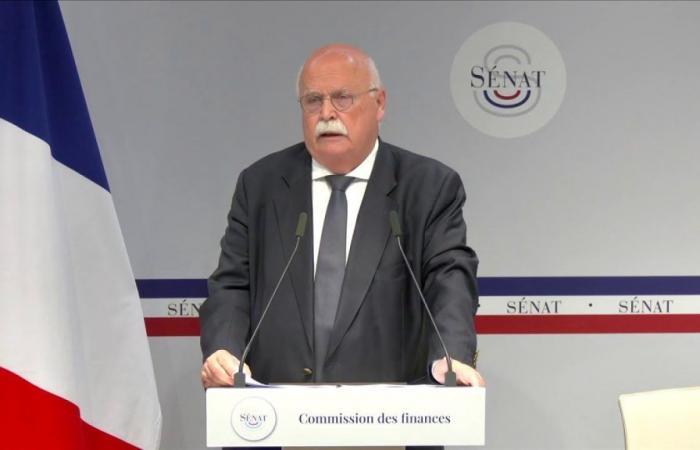
This report will probably not have the impact it could have had without the dissolution of the National Assembly and early legislative elections. But it will serve as a warning for the government which will be in charge after this double election. The report of the senatorial fact-finding mission on the deterioration of public finances, unveiled this Thursday, poses a severe and implacable diagnosis of the errors of the executive in its budgetary texts since the end of 2023. “There is one thing that We share with the Bercy administration that no one wants to see that anymore. We hope that this is the last year where we will see a subject of this nature,” summarized the president of the finance committee, the socialist Claude Raynal, at a press conference on June 13.
The conclusions of the transpartisan information mission, launched in March after the brutal revision of the 2023 deficit from 4.9% to 5.6% of GDP, were adopted unanimously the day before, the senators from the presidential camp (groups RDPI and Les Indépendants) abstained. After two and a half months of hearings and study of technical notes produced by the services of the Ministry of Economy and Finance, the senators draw the conclusion of significant deficiencies in the information that Parliament has the right to expect , but also the “recklessness” shown by the government in its forecasts.
“Poorly justified” revenue forecasts
This unprecedented slippage of more than 15 billion euros, between the initial finance law and its execution, is mainly explained by much lower revenue than expected. The senators consider that the government forecasts were “poorly justified” and “reckless”. All the major revenues go there: VAT revenues, income tax, and above all, corporate tax, the income from which was abnormally overestimated in April 2023 as part of the stability program, after two years already exceptional. For the senatorial mission, these amounts were “intended to maintain the announced deficit level”. Furthermore, according to them, the government did not sufficiently take into account the difficulties in estimating the fifth installment of corporate tax, due to the uncertainty linked to corporate arbitrations.
The senators particularly insist on the case of the “contribution on infra-marginal rents” (Crim), this tax put in place to recover a share of the superprofits from electricity. Its performance did not at all live up to the government’s expectations. Instead of the 12 billion expected in the initial finance law, it ultimately only brought in 626 million euros for the State, or 95% less. It must be said that his calculation was based on the highest electricity prices for the year 2022. “This is the very example of what should not be done”, railed the general rapporteur of the Finance Committee, Jean-François Husson (LR).
“A guilty procrastination”
This is the starting table. The report also highlights how the government sought to redress the situation during the last weeks of 2023, as forecasts darkened. The senators depict “the culpable procrastination of a government which does not heed the warnings of its administration”.
The senatorial mission mentions in particular a note dated 1er December 2023 in which the Directorate General of Public Finances and that of the Budget warn of the existence of a strong risk on VAT revenues in November and December. On December 7, the General Directorate of the Treasury anticipated a deficit of 5.2% of GDP instead of 4.9%, with a downward revision of 6.2 billion euros in revenue. These two notes were even more alarmist than the first alerts that occurred at the end of October. However, the government did not draw the consequences of these alerts in the examination of the budget by modifying the introductory article and the balancing article of the finance bill.
“The lack of rigor of the 2024-2027 stability program and the absence of an amending finance bill have, from our point of view, confirmed that the government was not taking the full measure of the issue and was not sufficiently take into account what his administration told him,” criticized Jean-François Husson this Thursday.
Beyond the delay in ignition and the “recklessness” of the forecasts, it is also the budgetary management actions that the senatorial mission took issue with. “Credit carryovers are used to reduce one year’s deficit, while gently increasing the following year’s deficit. Since 2020, we have been denouncing this phenomenon. It is imperative that the government puts an end to these credit deferrals,” urged Jean-François Husson.
The chairman of the finance committee denounces “budgetary opacity”
If the administration’s warnings on budgetary risks were not taken into account by the government, they also remained unknown to parliamentarians, until the general budget rapporteur in the Senate carried out his control. on documents and on site in Bercy on March 21. This Thursday, Claude Raynal said he regretted this “budgetary opacity”.
To guarantee good information to Parliament during the vote on finance bills and to enable budgetary control, the senatorial mission recommends the transmission of technical notes on growth, revenue or deficit forecasts to the presidents of the finance and to their two general rapporteurs, “in a secure form”. Hearing on May 30, Bruno Le Maire himself made this proposal.
This openness, however, did not make the executives of the finance committee forget the minister’s breach of the provisions of the organic law relating to finance laws (LOLF). After the publication of a decree canceling 10 billion euros of expenditure, the general rapporteur wrote to the minister on February 21 to find out what the updated deficit for 2024 would be. In response, the government told him that this information would be given in the stability program. This was without counting on a document that the fact-finding mission obtained. “As part of our work, we discovered a Treasury note from February 16, 5 days before. The information we requested did indeed exist, and showed a balance forecast of -5.7% of GDP and not 4.4% for 2024.” This alert did not prevent the minister from trumpeting on TF1 on February 18 that the deficit would be held at 4.4% of GDP. “This information was therefore not transmitted to the commission. It is neither more nor less a clear violation of article 57 of the LOLF,” said Jean-François Husson. Under this article, a chairman or general rapporteur of a finance committee must be able to obtain any requested document concerning public finances. For the senator from Meurthe-et-Moselle, this is a “new example” of “retention of information operated by the government”, an accusation which Minister Bruno Le Maire defended himself on several occasions at the end of May .
A proposed organic law in the sights of the senatorial mission
In addition to these systematic transmissions of technical notes, while respecting their confidentiality, the Finance Committee calls for other measures to improve future budgetary discussions. It calls for the publication of fiscal or macroeconomic estimates with confidence intervals or “alternative scenarios”. If these intervals are exceeded, the commissions would be seized “without delay”.
The senators also want to impose the presentation of a amending finance bill “in the event of a significant change in forecasts” based on the initial finance law. They also defend a strengthening of the prerogatives of the High Council of Public Finances, imagining a new referral to this body at the time of the “recalibration” of the finance bill in the event of updating of the hypotheses of growth, inflation and deficit.
“There will be a debate between the new government and ourselves,” warns Claude Raynal, who also “undoubtedly” plans a proposal for an organic law to integrate the desired developments into the LOLF.
“The elements that we provide today are greatly enlightening elements when we hear about auditing of accounts,” insisted Jean-François Husson, in a reference to the proposal formulated by the National Rally. “What will be important is the way in which Parliament and the executive will, or not, find ways to improve the dialogue around the finance bill, which is still essentially the moment of truth. » At a time when political uncertainty has never been higher, the Finance Committee hopes to study the next budget – which promises to be particularly difficult – with all the transparency it demands.





